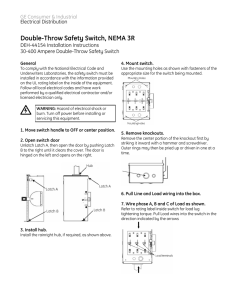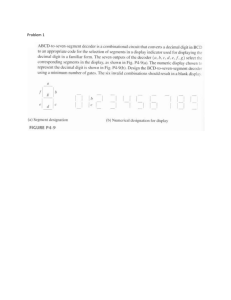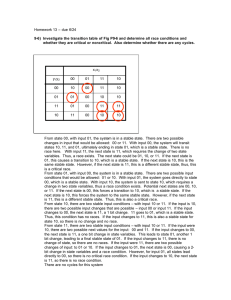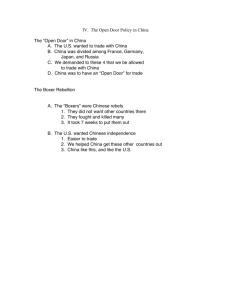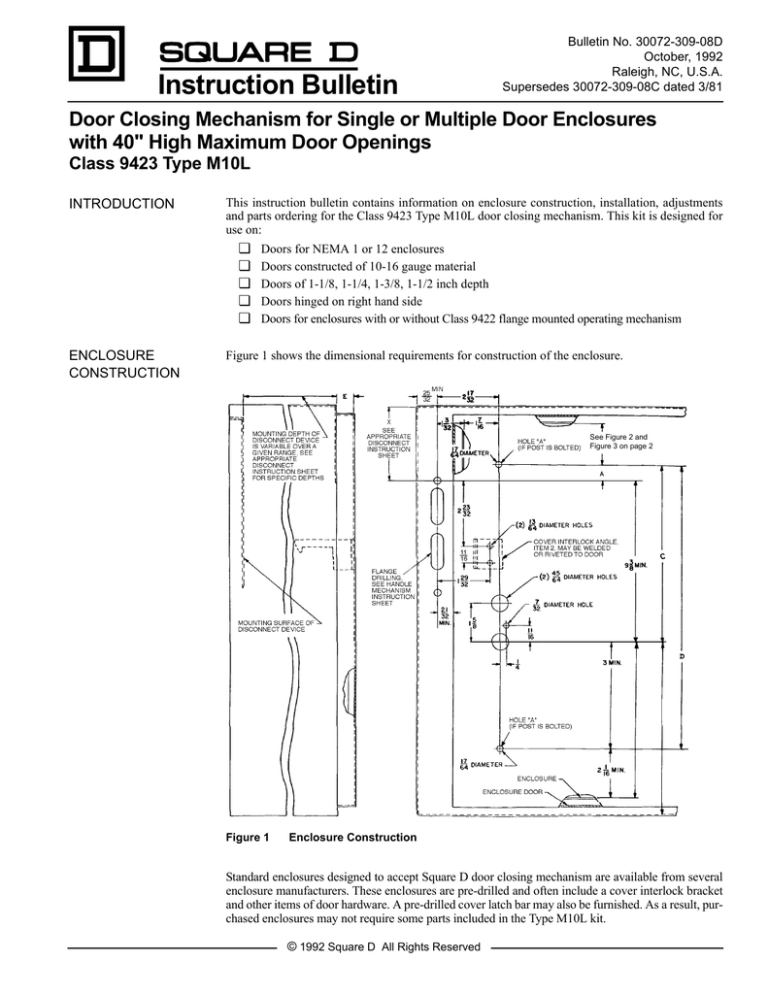
Instruction Bulletin
Bulletin No. 30072-309-08D
October, 1992
Raleigh, NC, U.S.A.
Supersedes 30072-309-08C dated 3/81
Door Closing Mechanism for Single or Multiple Door Enclosures
with 40" High Maximum Door Openings
Class 9423 Type M10L
INTRODUCTION
This instruction bulletin contains information on enclosure construction, installation, adjustments
and parts ordering for the Class 9423 Type M10L door closing mechanism. This kit is designed for
use on:
❏
❏
❏
❏
❏
ENCLOSURE
CONSTRUCTION
Doors for NEMA 1 or 12 enclosures
Doors constructed of 10-16 gauge material
Doors of 1-1/8, 1-1/4, 1-3/8, 1-1/2 inch depth
Doors hinged on right hand side
Doors for enclosures with or without Class 9422 flange mounted operating mechanism
Figure 1 shows the dimensional requirements for construction of the enclosure.
See Figure 2 and
Figure 3 on page 2
Figure 1
Enclosure Construction
Standard enclosures designed to accept Square D door closing mechanism are available from several
enclosure manufacturers. These enclosures are pre-drilled and often include a cover interlock bracket
and other items of door hardware. A pre-drilled cover latch bar may also be furnished. As a result, purchased enclosures may not require some parts included in the Type M10L kit.
© 1992 Square D All Rights Reserved
Door Closing Mechanism
Class 9423 Type M10L
Bulletin No. 30072-309-08D
October, 1992
Follow the procedures below when constructing the enclosure:
1. If door closing mechanism is used with a Class 9422 disconnect switch or circuit breaker operating mechanism, see appropriate instruction sheet for flange drilling information and additional construction dimensions. Measure dimension B and drill hole A per Figure 2 or Figure 3. See
Table 1 for figure selection.
Table 1
Positioning Roller
Latch Assembly
B (range)
Refer to
1-11/16” to 5-5/16”
Figure 2
5-5/16” or more
Figure 2
or Figure 3
Figure 2
Positioning Roller Latch,
B = 1-11/16" to 5-5/16"
Figure 3
Positioning Roller Latch,
B Š 5-5/16"
If door closing mechanism is used independently, roller latch assembly may be assembled either per Figure 2 or Figure 3.
2. Drill all remaining holes shown in Figure 1 on page 1 observing minimum dimensions. Assemble
cover interlock blade, item 1, and cover interlock angle, item 2, with two screw assemblies, item
22, for appropriate door depth as shown in Figure 4.
Figure 4
Door Depth Dimensions
3. Weld or rivet (rivets are included with the handle mechanism kit) cover interlock angle to door.
If post (customer supplied item) is to be welded to door, weld it at this time as shown in Figure
5. Enclosure may be painted at this time.
Figure 4)
NOTE
Before installing rivet (item 23),
refer to Figure 2 and Figure 3 to
determine in which hole of the
latch arm to place the rivet.
Figure 5
Welding Post to Door and Assembling Roller Latch
4. Fabricate cover latch bar from 1/4" x 1/2" steel bar per Figure 6. Determine dimensions C and D
by measuring appropriate holes in enclosure door as shown in Figure 1. Determine dimension A
by measuring between flange and door holes as shown above in Figure 2 or Figure 3.
© 1992 Square D All Rights Reserved
Page 2
Door Closing Mechanism
Class 9423 Type M10L
Bulletin No. 30072-309-08D
October, 1992
Figure 6
INSTALLATION
Cover Latch Bar
Figure 7
Latch Mechanism
To install the door closing mechanism, follow the procedures below.
1. Attach 1/2" wide gasket around inside of door as shown in Figure 7.
2. Using rivets (item 23), rivet spacers (item 3) and roller latch arms (item 4) to cover latch bar.
Using rivet (item 27), rivet latch bracket (item 15) to cover latch bar. ROLLER LATCH ARMS
AND BRACKET MUST BE FREE TO ROTATE.
3. Using two screw assemblies (item 24), attach latch bar angle (item 5) to cover latch bar. Using
two screw assemblies (item 22), assemble latch bar blade (item 6) to latch bar angle for appropriate door depth as shown in Figure 4 on page 2.
4. Position gasket (item 7) and front plate assembly (item 8) on door. Thread defeater pin bushing
(item 9) and handle shaft bushing (item 10) into front plate assembly.
5. If post has not been welded to door: mount gasket and post, (customer supplied) roller latch
arms (item 4) and washer (item 11) to door with screw, lockwasher and nut (customer supplied)
as shown in Figure 8 on page 4. If post has been welded to door: mount roller latch arms and
washer to post with screw and lockwasher (customer supplied) as shown in Figure 5 on page 2.
6. Place “O” ring (item 12) in groove in handle assembly (item 13). Lubricate handle assembly
shaft and slide handle assembly into handle shaft bushing (item 10). Engage latch bar spring
(item 14) with latch bracket (item 15) and place them over the handle shaft bushing. Latch bar
spring must be positioned as shown in Figure 8 on page 4. Secure handle assembly with lockwasher and nut (items 25 and 26).
7. Place cover interlock spring (item 16) over defeater pin bushing (item 9) and position as shown
in Figure 8 on page 4. Place “O” ring (item 17) in groove in defeater pin (item 18) and lubricate
defeater pin. Slide defeater pin into defeater pin bushing. Using two screw assemblies and nuts
(items 28 and 29), assemble locking lever blade (item 19) and locking lever base (item 20) for
appropriate door depth as shown in Figure 4 on page 2. Slide locking lever base onto defeater
pin and engage cover interlock spring. Secure with lockwasher and nut (items 25 and 26).
8. Apply pressure sensitive instruction plate (item 21) to enclosure flange adjacent to handle assembly. FLANGE MUST BE CLEAN AND DRY FOR INSTRUCTION PLATE TO ADHERE.
ADJUSTMENT
PROCEDURE
When using these door closing mechanisms with a disconnect switch or circuit breaker operating
mechanism, follow the adjustment procedures below.
1. With disconnect switch or circuit breaker in “OFF” position, open door with screwdriver per
instruction plate (item 21).
2. Close door but do not turn door handle. Door should latch so that it cannot be opened again
without a screwdriver. It should be impossible to close the disconnect switch or circuit breaker
with door in this position.
3. Turn door handle to handle stop. Door should seal tightly. It should now be possible to close
the disconnect switch or circuit breaker if the latch bar blade (item 6) has been positioned correctly. Adjust blade if required.
4. With disconnect switch or circuit breaker in “ON” position, it should be impossible to open
door. If door can be opened, bend cover interlock blade (item 1) downward. If entry to controller is desired with the disconnect switch or breaker in the “ON” position: FIRST – Unlatch door
handle and maintain opening pressure. SECOND – Operate defeater screw in disconnect handle. Door should now open.
No adjustment is required when using these door closing mechanisms without a disconnect switch
or circuit breaker operating mechanism.
© 1992 Square D All Rights Reserved
Page 3
Door Closing Mechanism
Class 9423 Type M10L
PARTS LIST
Item
1
2
3
Bulletin No. 30072-309-08D
October, 1992
Table 2
Parts List
4
5
6
7
8
Description
Cover Interlock Blade
Cover Interlock Angle
Spacer, 3/8 x 3/8, for 1-1/8" deep doors
Spacer, 3/8 x 1/2, for 1-1/4" deep doors
Spacer, 3/8 x 5/8, for 1-3/8" deep doors
Spacer, 3/8 x 3/4, for 1-1/2" deep doors
Roller Latch Arm
Latch Bar Angle
Latch Bar Blade
Gasket
Front Plate Assembly
Part Number
30007-213-01
30007-218-01
30007-219-01
30007-219-02
30007-219-03
30007-219-04
30007-139-50
30007-214-01
30007-215-01
31008-050-01
30007-100-50
9
10
11
12
13
14
15
Defeater Pin Bushing
Handle Shaft Bushing
Washer, 1/4"
“O'' Ring, 3/8"
Handle Assembly
Latch Bar Spring
Latch Bracket
31008-118-01
31008-119-01
23602-11606
29206-00240
31008-125-50
30017-171-01
30007-096-02
Quan.
1
1
Item
16
17
18
19
20
Description
Cover Interlock Spring
“O” Ring, 1/4"
Defeater Pin
Locking Lever Blade
Locking Lever Base
Part Number
30017-172-01
29206-00160
31008-061-01
30007-212-01
30007-211-04
Quan.
1
1
1
1
1
2
1
1
1
1
21
22
23
24
25
26
27
28
29
30009-032-01
21911-14081
30007-216-01
30007-216-02
30007-216-03
30007-216-04
21911-14141
23701-00240
23003-00240
31008-124-01
21911-14161
23001-00140
1
4
1
1
2
1
1
1
1
Instruction Plate
Screw Assembly 8-32 x 1/4
Rivet, 1/4 x 29/32, for 1-1/8" deep doors
Rivet, 1/4 x 1-1/32, for 1-1/4" deep doors
Rivet, 1/4 x 1-5/32, for 1-3/8" deep doors
Rivet, 1/4 x 1-9/32, for 1-1/2" deep doors
Screw Assembly, 8-32 x 7/16
Lockwasher, 3/8"
Nut, 3/8-16
Rivet, 5/16 x 7/16
Screw Assembly, 8-32 x 1/2
Nut, 8-32
2
2
2
2
2
1
2
2
Figure 4 on page 2)
PLEASE NOTE:
Electrical equipment should be
serviced only by qualified electrical maintenance personnel, and
this document should not be
viewed as sufficient instruction
for those who are not otherwise
qualified to operate, service or
maintain the equipment discussed. Although reasonable care
has been taken to provide accurate and authoritative information
in this document, no responsibility is assumed by Square D for any
consequences arising out of the
use of this material.
NOTE
Figure 4 on page 2)
Figure 8
Before installing rivet (item 23),
refer to Figure 2 and Figure 3
on page 2 to determine in
which hole of the latch arm to
place the rivet.
Door Closing Mechanism Assembly Drawing
© 1992 Square D All Rights Reserved
Page 4


